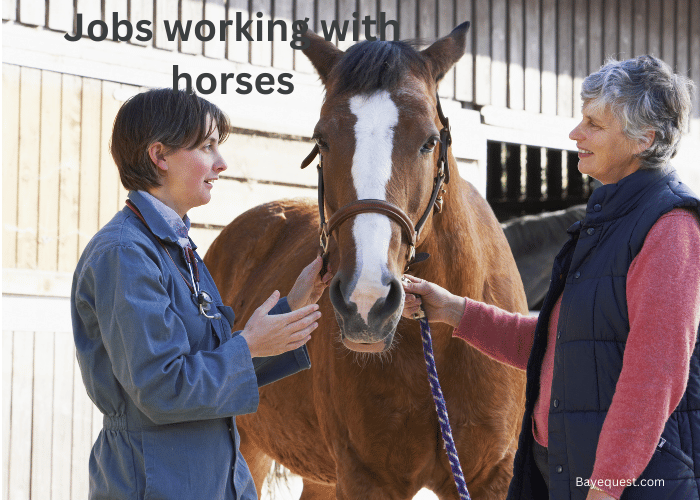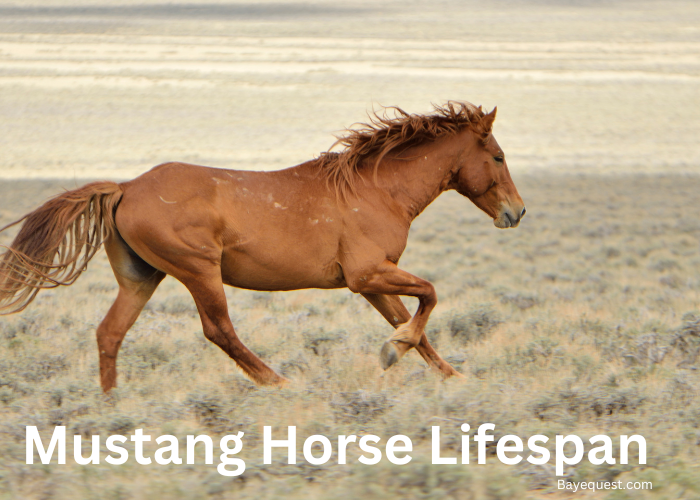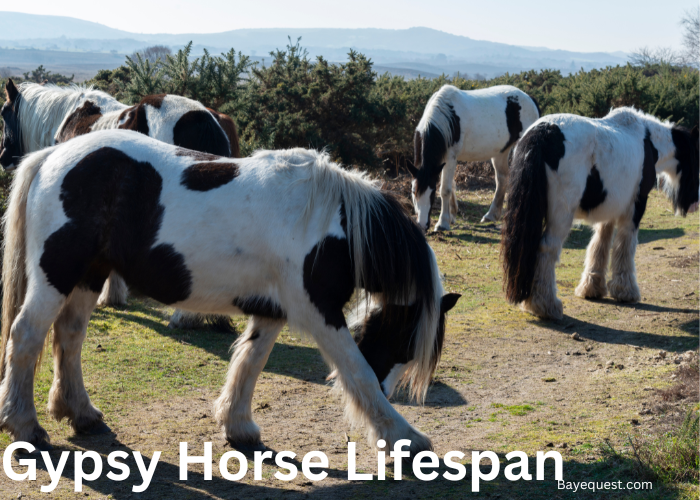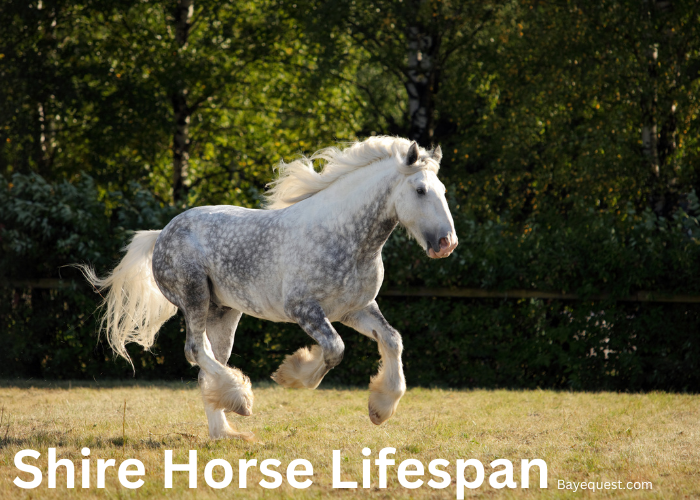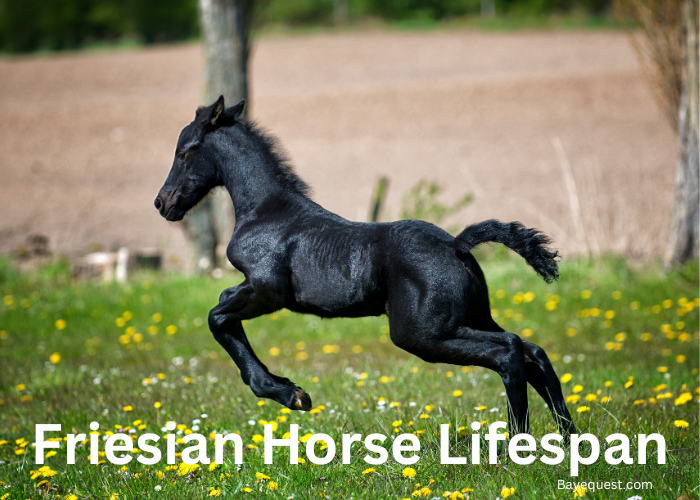Did you know the equine industry supports over 1.6 million jobs annually? As a seasoned professional in this field, I understand the appeal of blending your love for horses with a fulfilling career.
Whether seeking a new path or already immersed in this passion, this guide will help you explore diverse roles. Ready to turn horseplay into a paycheck? Dive in to discover the rewarding horse careers awaiting you.
Popular Equine Careers
- Equine veterinarian
- Equine dentist
- Equine nutritionist
- Farrier
- Rider instructor
- Equine massage therapist
- Breeder
- Braider
- Mounted patrol officer
- Rodeo announcer
22 Best Jobs Working With Horses
Here are some of the best jobs with horses that you’d love:
1. Equine veterinarian
Equine veterinarians are essential in the horse world, with an average salary of around $90,000, though this can vary. Their primary duties include caring for horses’ health through surgeries, treatments, and preventive care.
To become one, you’ll need to attend veterinary school with a focus on equine medicine, earn a Doctor of Veterinary Medicine (DVM) degree, and obtain a state license.
You’ll have to start in a clinic, after which you may choose to specialize in areas like surgery or dentistry, or even open your practice.
Growth in this equestrian career comes with experience and further specialization.
2. Equine dentist
An equine dentist, focusing on horses’ oral health, earns around $50,000, though this varies. They treat and prevent dental issues, requiring courses in equine dentistry and hands-on training.
Certification is often needed, and some regions need a veterinary background. Starting with an apprenticeship is common, leading to independent work.
To advance, you’ll need to build a good reputation.
3. Equine nutritionist
These specialists earn salaries between $50,000 to $60,000. They craft diet plans to meet horses’ nutritional needs.
To be an equine nutritionist, you’ll need a background in animal science or nutrition with a focus on horses. Growth in this career comes with ongoing education and specialization.
Start in consulting or research, them move into more prominent roles or private consulting.
4. Farrier
Talking about a salary range from $40,000 to even six figures, farriers are the unsung heroes keeping horses on their feet — literally. The craft? It’s all about shoeing horses and caring for their hooves.
Training takes a blend of school and real-world apprenticeship. Once you’ve got your anvil and hammer ready, it’s about building a name for yourself, mastering new techniques, and maybe even teaching others the trade.
5. Bloodstock agent
Imagine being the horse world’s version of a talent scout and dealmaker, with your earnings swinging wildly based on your success. No standard path here, but knowing the ins and outs of horse racing and breeding is key.
Start in the stables or sales, then hustle your way up. It’s all about who you know and making the right bets on the right horses.
6. Breeder
For breeders, it’s a game of genetics and passion, with earnings as varied as the breeds they work with. Learning is hands-on, peppered with courses in genetics.
You start small, maybe with just a mare or two, and dream big. Specializing in a breed or discipline can put your name out there.
7. Breeding manager
Managing a breeding operation means you’re in charge of everything from who meets who to caring for the foals. Salaries hover around $45,000 to $70,000.
Degrees in animal science or equine studies set the stage, and climbing the ladder starts with getting your boots dirty in assistant roles. It’s a mix of science, management, and a whole lot of horse sense.
8. Groom/stable hand
With pay ranging from $25,000 to $35,000, this job is all about the day-to-day love and labor of horse care. It’s more hands-on than bookish, and there’s a clear path from mucking stables to managing them.
Specializing in certain care aspects can make you the go-to person for those services.
9. Sales broker
Think of yourself as the bridge between horse buyers and sellers, with your income riding on commissions. It’s a blend of equine knowledge and sharp sales skills.
Starting might mean working in sales or getting to know the ropes in equine management. Building a network is your ladder to success here.
10. Photographer or videographer
Capturing horses in their element can net you anywhere from $30,000 to way beyond, depending on your gigs. It’s all about the angle, lighting, and capturing that perfect moment.
A portfolio that shouts “horse lover” is your ticket in. From there, it’s about making a name for yourself in a niche that combines art, action, and the beauty of horses.
11. Equine show manager
Imagine being the maestro of a horse show, where your job is to make sure everything runs smoothly. The pay can vary a lot, but think about the satisfaction of pulling off a successful event.
You’ll need a mix of experience in event planning and a deep understanding of the equine world. No specific degree required here, but courses in management or equine studies sure help.
Starting small and working your way up through volunteering at shows is a great path.
12. Saddle maker and fitter
Crafting saddles is an art form, blending tradition with custom fits for both horse and rider. Salaries can swing widely, based on reputation and skill.
Apprenticeships under skilled craftsmen are the golden ticket here. While there’s no formal degree, a passion for craftsmanship and horses is essential. It’s a career where you can truly leave a mark, one saddle at a time.
13. Rider instructor
Teaching folks how to ride? It’s rewarding, with salaries usually around the $30,000 to $50,000 mark, depending on your experience and location.
Certification through recognized riding organizations sets you apart. Many instructors start with a strong personal background in riding and then decide to share their passion and knowledge.
To grow, you’ll have to expand your client base and specialize in disciplines like dressage or show jumping.
Related read: Can You Ride a Horse Without a License?
14. Braider
Braiding a horse’s mane and tail is more than just making them look pretty. It’s about tradition, and in some disciplines, it’s a must.
This gig is usually part-time, with pay per horse. No formal education is required, but learning the ropes comes from hands-on experience.
Start by practicing on a few friendly horses, and soon, you might be the go-to braider at shows.
15. Equine massage therapist
Helping horses relieve stress and muscle tension through massage is as specialized as it sounds. The salaries are usually around $50,000 for the experienced.
Certification is key, and there are specific courses for being an equine chiropractor. Starting involves learning anatomy and massage techniques, then building a clientele by proving your skills.
16. Stable and boarding manager
Running a boarding stable means you’re in charge of the care, feeding, and happiness of boarded horses. Think about making around $35,000 to $60,000, depending on the size and prestige of the facility.
Experience in horse care is crucial, and business management skills are a plus. Climbing up means starting with hands-on roles in stables and taking on more management responsibilities.
17. Equine product sales representative
Here’s to the folks connecting horse owners with the products they need, from tack to supplements. Salary often includes a base plus commission, so the more you sell, the more you earn.
A background in sales is great, but knowledge of horse care products is a must. Start by getting to know the products inside and out, and grow by building lasting relationships with customers.
18. Equine transport provider
Transporting horses, whether to shows or new homes, requires a deep understanding of their needs on the road. It’s a niche with variable earnings, depending on how far and how often you transport.
Licensing for transporting livestock is a must, along with a reliable and equipped vehicle. Start small, perhaps locally, and as your reputation for care and reliability grows, so can your business.
19. Equine rescue organizer
Running a rescue is all about the love of horses and the desire to see them in better situations. It’s more passion than the paycheck, with many in the field working for the love of the cause.
Experience in horse care and non-profit management helps. Starting one involves understanding both the needs of horses and the legalities of running a rescue.
Growth comes from networking, fundraising, and community involvement.
20. Mounted patrol officer
Being a part of a mounted patrol means you’re keeping places safe, on horseback. Salaries can align with standard police officer wages, around $50,000 to $70,000.
Training involves law enforcement academy plus specialized mounted training. Many start as police officers, then apply to the mounted unit. It’s a role where your love for horses meets your commitment to public service.
21. Equine insurance agent
This equine job is about helping horse owners navigate the complex world of equine insurance. A background in insurance or finance is helpful, and understanding the unique needs of horse owners is a must.
Starting in general insurance and then specializing in equine policies is one way to go. Success comes from building trust and a deep understanding of the equine industry.
22. Rodeo announcer
Bringing the excitement of the rodeo to life, announcers can earn a range depending on gigs and fame. A background in broadcasting or public speaking, plus a love and knowledge of rodeo, sets the stage.
Starting might mean volunteering at local events, with growth coming from building a signature style and becoming a familiar voice at bigger rodeos.
Read also: How do you freeze brand a horse?
Careers Dealing With Horses: FAQs
Do I need a degree to work with horses?
Not always. While some jobs, like equine veterinarians or nutritionists, require specific degrees, many roles value hands-on experience and certifications more. Apprenticeships and vocational training can also open doors in this field.
How can I gain experience working with horses?
Start by volunteering at local stables, rescues, or therapeutic riding centers. Internships and apprenticeships are great ways to learn and show your commitment. Even part-time work as a stable hand can teach you a lot about horse care.
What’s the best job for someone who loves horses but doesn’t have much experience?
Consider starting as a groom or stable hand. These positions allow you to learn basic horse care skills and understand horse behavior up close, serving as a stepping stone to more specialized roles.
Are there equine related careers that don’t involve physical work?
Yes! Jobs like equine insurance agent, sales representative for equine products, or roles in equine event management focus more on business skills than physical labor.
Read also: How Much Does it Cost to Lease a Horse?
Can I make a living working with horses?
Absolutely. While entry-level positions might start with modest pay, specialized roles like equine veterinarians, farriers, and trainers can offer lucrative opportunities. Like any field, making money with horses involves building a reputation which can lead to higher earning potential.
Equine Occupations: Conclusion
And there you have it, folks—a gallop through the horse related careers. These jobs aren’t just about making a living. They’re about making a life intertwined with the grace and spirit of horses.
Whether you’re drawn to the hands, the strategic eye, or the nurturing heart of rescue work, there’s a path waiting for your footsteps.
Remember, working with horses is about forming connections. It’s about continuous learning, growing, and embracing every sunrise with the promise of new challenges and joys.
So, whether you’re just starting out on this journey or looking to trot down a new trail, the world of equine careers is wide open.




